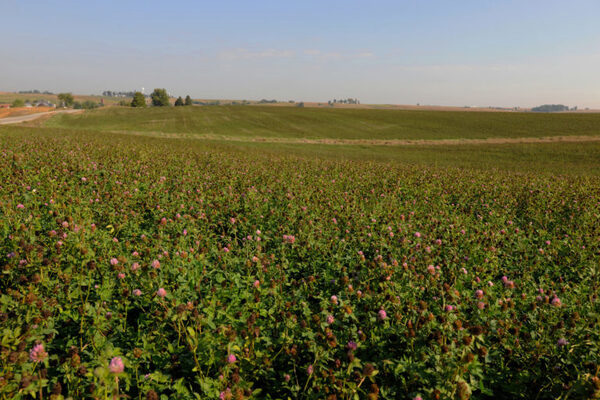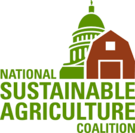The US Department of Agriculture (USDA) recently announced the availability of up to $40 million for nutrient management projects funded through grant agreements, called RCPP Grants. Applications for RCPP Grants will be accepted until October 31, 2022. In this blog post, NSAC provides background on RCPP, highlights some Fiscal Year (FY) 2022 awards, and provides details on this new iteration of RCPP.
 An eastern Iowa farmer is improving the soil in an otherwise unproductive field by growing red clover and harvesting the seed for neighbors to use for cover crops.
An eastern Iowa farmer is improving the soil in an otherwise unproductive field by growing red clover and harvesting the seed for neighbors to use for cover crops.
Background
The Regional Conservation Partnership Program (RCPP) brings the expertise of farmers, conservation and farm organizations, and state and local agencies to conserve thousands of acres of land across the country. This program focuses on protecting watersheds by promoting soil health, well-managed working farmland, and conservation practices.
RCPP is different from other federal conservation programs in that projects must be undertaken as partnerships between a variety of stakeholders, including non-profit groups, land trusts, landowners, and other groups. Through RCPP projects, farmers and landowners may receive payments from the organization leading the partnership rather than directly from the Natural Resources Conservation Service (NRCS). The organizations that participate in the program are expected to provide significant matching funds for the project, including in-kind services such as monitoring, conservation planning, and producer assistance. Farmers who participate in the program will most often work with partner organizations rather than with NRCS directly.
RCPP projects intend to address specific natural resource concerns at a landscape scale. This can include individual states, larger regions, or entire watersheds. These areas are known as Critical Conservation Areas (CCAs). Some CCAs include the Chesapeake Bay watershed, the Mississippi River Basin, the Prairie Grasslands region, and the Colorado River Basin, as well as others.
The Program in Action
Since RCPP's creation in 2014, USDA has partnered with local and state units of government, non-profit organizations, and private sector actors to invest billions in conservation projects across the country. Projects have focused on wildlife conservation, soil health, water quality, and many other conservation priorities. For FY 2022, USDA awarded 41 new partnership projects, totaling $197 million. For a full list of projects, visit this website.
Types of Funding Opportunities
Traditionally, there have been two types of national funding announcements under RCPP: RCPP Classic and RCPP Alternative Funding Arrangements (AFAs).
- RCPP Classic is the standard version of the program where NRCS and the lead partner both oversee contracts with producers and landowners engaged in RCPP projects. The 2018 Farm Bill modified the funding pools within RCPP – allocating 50 percent of total funding for projects in CCAs, and 50 percent for state and multi-state projects administered at the local level with the advice of the applicable state technical committees.
- RCPP Alternative Funding Arrangements are partner-led projects that propose innovative uses of federal assistance to achieve conservation benefits that are not possible under the standard RCPP construct. This means that through AFAs, eligible partners can implement projects and provide financial assistance directly to producers.
Alternative Funding Arrangements versus RCPP Grants
With this latest funding announcement, NRCS is utilizing existing authority for RCPP AFA awards to fund similarly structured projects via grant agreements or RCPP Grants. This is different from past AFA awards that were administered using programmatic partnership agreements and associated supplemental agreements. What this means in practice is that applicants must demonstrate the ability to fully administer the awarded funds (e.g., contract with producers). NRCS will not support this component of projects funded in this competition.
This new funding opportunity maintains most of the other elements of AFA competitions and awards. Applicants must still show that the project they propose does not fit inside an RCPP Classic competition. Preference is still given to projects that:
- Use innovative approaches to leverage Federal investments in conservation;
- Deploy a pay-for-performance conservation approach;
- Seek large-scale infrastructure investments that generate conservation benefits for agricultural producers and nonindustrial private forest owners.
RCPP Grants projects can last up to five years, and projects can request funding amounts between $250,000 and $10 million over the life of the project.
Finishing Fiscal Year 2022
After the 2018 Farm Bill, NRCS can enter into up to 15 AFAs or grant agreements per year. The AFA awards were already made in FY 2022. This RCPP Grants competition will add seven awards to meet the 15 projects' annual cap and spend down the remaining FY 2022 RCPP funds.
For this unique competition, only projects located in CCAs with water quality degradation identified as a Priority Resource Concern (PRC) are eligible. The Prairie Grasslands Region is the only CCA without this PRC. Further, this competition aims to fund projects with an explicit focus on improving water quality through nutrient management. Successful project proposals will demonstrate familiarity with the NRCS 590 Nutrient Management practice standard and associated practice standards that impact nutrient management. If partners propose alternative nutrient management approaches, the proposal must address any deviations from NRCS practices and methods, and proposals must address the relative benefits in the project area.
How to Apply
To apply, applications should be submitted by October 31, 2022. The agency anticipates making proposal selections by January 2023 and anticipates completing project negotiations and making awards by June 1, 2023. These dates are projected and are subject to change.
RCPP Grants differ from other RCPP competitions in that applications are submitted through grants.gov. This is a significant change as RCPP applications are normally submitted through a unique application portal. Applicants will need to register for a gants.gov account and a System Award Management (SAM) account and get a Unique Entity Identifier (UEI) from SAM.gov.
The UEI is part of larger efforts to streamline federal grant-making processes. Previously, applicants to grants.gov had to obtain a Dun and Bradstreet Data Universal Numbering System (DUNS) number and separately maintain a SAM registration. The UEI is assigned by SAM as part of the registration process and replaces the DUNS number. Follow the links above to complete the required registrations. This information is in the full award package posted on grants.gov.
For more information:
Sustainable Agriculture
sustainableagriculture.net
